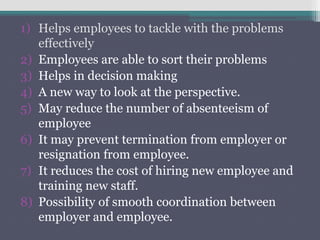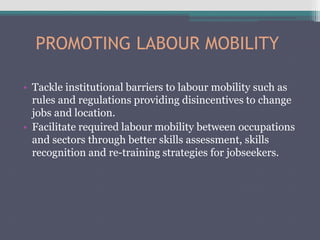Career counseling
- 2. WHAT IS CAREER COUNSELLING • One of the most crucial issues facing management is preserving employee commitment to company goals and objectives despite organizational instability. We are experiencing a time of great organizational change led by oversees outsourcing, downsizing, global restructuring, and diminishing career advancement paths. Because of these changes, employees are less likely to rise up the ranks and more likely to change jobs or area of specialization often. With performance being a fundamental cornerstone to financial success, employers will need to implement continuous learning programs and enable employees to acquire new skills to thrive.
- 3. • At any time, employees may experience career challenges which may seriously affect success at the company. If these difficulties go unresolved for a period of time, they are likely to impact the employee's ability to cope effectively on the job. For senior-level professionals, the impact can be even more devastating because their work usually has a direct impact on overall business strategy and direction. Career counseling is a strategic resource that employees can use and managers can rely on when work performance, career transition, personal conduct in the workplace and/or cultural fit becomes an issue. It provides a means for employers to encourage their employees to seek career assistance early to prevent small problems from getting out of hand and creating greater barriers to success. It's also a way to help key employees reach higher career aspirations so that they continue to add significant value to the company.
- 4. NEED OF CAREER COUNSELLING • Employees face through the stress of completing the targets, work-load, meeting deadlines, relations with subordinates or colleagues, work-life balance, lack of time and higher responsibility. • Counselling helps the employees to come out from the problems, gives a new way to deal with the problems. Counselling shows how much the employer care for the employee. • Counselling may help to identify the employee the work related problems and the poor performance.
- 5. 1) Helps employees to tackle with the problems effectively 2) Employees are able to sort their problems 3) Helps in decision making 4) A new way to look at the perspective. 5) May reduce the number of absenteeism of employee 6) It may prevent termination from employer or resignation from employee. 7) It reduces the cost of hiring new employee and training new staff. 8) Possibility of smooth coordination between employer and employee.
- 7. ANTICIPATING EMERGING SKILL NEEDS AND ADAPTING POLICIES ACCORDINGLY • Systematically collect and use robust and accessible information on current and expected future skills demands to provide timely information to relevant stakeholders on the content and type of education and training required. • Promote co-ordination mechanisms and social dialogue, including working groups, round tables and sector skills councils, to ensure a better collection, dissemination and use of skill needs information by all relevant stakeholders • Where the demand for skills cannot be fulfilled by employers themselves, strengthen the incentives and enforcement of training systems to be responsive to demands, e.g. through performance contracts.
- 8. REINFORCING THE ROLE OF TRAINING AND WORK-BASED LEARNING • Expand participation in work-based learning to promote successful transitions from school to work and improve the quality of skills development. • Promote job retention and re-employment through retraining and active labour market programs in response to structural change; Enhance flexibility and governance within the TVET system at the local level to ensure that institutions and programmes adapt to the needs of employers, individuals, and the local labour market more generally. • Foster the participation of individuals from disadvantaged groups – low-skilled, youth, migrants -- in life-long learning and employability programmes by addressing barriers to participation and providing appropriate incentives. • Pursue a balance between responding to specific employer needs while developing more general transferable skills that will be beneficial to individuals throughout their working lives.
- 9. ENHANCING THE ADAPTABILITY OF WORKPLACES • Foster a better use of existing skills by promoting innovation and the introduction of high-performance work practices • Facilitate local and national partnerships which reduce policy silos and bring social partners together with training organisations and other intermediaries to design strategies which seek to improve the adaptability of workplaces
- 10. PROMOTING LABOUR MOBILITY • Tackle institutional barriers to labour mobility such as rules and regulations providing disincentives to change jobs and location. • Facilitate required labour mobility between occupations and sectors through better skills assessment, skills recognition and re-training strategies for jobseekers.









